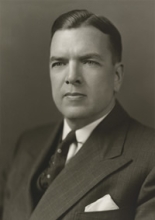Norman Littell

Early History/Schooling: Littell was born in 1899 in Indianapolis to Dr. Joseph and Clara Munger Littell. Littell attended Wabash College and continued his education at Oxford after he was awarded a Rhodes scholarship. He graduated from the University of Washington’s law school in 1927.
Tenure as AAG: Littell was appointed AAG by President Franklin Roosevelt in 1939. In 1939 and 1940, he appears to have been very active in the Roosevelt Administration, and was one of the federal officials who spearheaded efforts to drum up support for a third term for the President. However, after Francis Biddle was appointed Attorney General, Littell fell out of favor with many in the Roosevelt Administration. Described as “a passionate crusader for good government,” Littell zealously denounced government-assisted monopolies, support for big business, and special favors, even as they related to the war effort. His outspokenness gained him many enemies among Roosevelt New Dealers, including AG Biddle.
Under Littell, the Division spent significant effort acquiring land for the war effort. The Division “remodeled” the land acquisition process beginning in 1939, putting such land acquisitions on an assembly line process, and acquisitions proceeded at a furious pace after the attack on Pearl Harbor in December 1941. Between July 1938 and October 1943, the United States had taken or was in the process of taking 11,254,384 acres – an area approximately the size of New England – for use by the Army, Navy, and Coast Guard. An additional 10,507,892 acres were transferred from the public domain, including mining claims and grazing lands. The Division required an average elapsed time of only six days and four minutes from the time a request reached the Division to the moment title was vested or possession ordered by a federal court. In fiscal year 1942, the Division wrote 70,000 title opinions; in 1943, it wrote 95,000.
Littell also was involved in efforts to combat discrimination and anti-Semitism, and was described as being “in charge of law enforcement against subversive activities.”
Littell was also involved in controversy surrounding the Elk Hills deal, a 1942 contract signed by the Navy to allow Standard Oil Company to take more than $30,000,000 worth of oil from the Elk Hills Reserve in California, one of the richest oil fields in the world. Littell declared the contract illegal and invalid because it disproportionately benefitted the oil company and, according to Littell, went “far beyond” the Teapot Dome-Elk Hills oil leases of 1922 because it actually conveyed an interest in the reserve to the oil company.
On November 18, 1944, AG Biddle asked Littell to resign on the grounds that they were “personally incompatible.” This created much controversy, as several in Congress came to Littell’s defense, describing him as “one of the most outstanding and fearless public servants in the entire American Government.” As Time reported in 1944, “Instead of his resignation, Littell wrote out a withering 12,000-word blast at his boss” charging that the Attorney General “was guilty of ‘confusion [and] superficiality of mind . . . frustration . . . personal vanity . . . devious ways . . . petty, personal animosity . . . intimate connections’ with Lobbyist Tommy Corcoran to the detriment of the public interest.” Littell also criticized three of the Administration’s planned actions, including the Navy Department’s Elk Hills oil deal, a maneuver to dispose of $15 billion in Government-owned lands through the National Association of Real Estate Boards, and a War Department plan to turn back the Breakers Hotel in Florida to private owners, at a loss to taxpayers. He also alleged that Biddle and lawyer-lobbyist Thomas Corcoran had a corrupt relationship, and that Corcoran was influencing Biddle to pressure Littell to settle cases on terms unfavorable to the government. On November 30, 1944, President Roosevelt found that Littell’s public statements constituted insubordination, and removed him from office.
Career: After graduating from law school, Littell practiced law in the Seattle area for several years before moving to the Washington, D.C. area in 1934. He then served as Special Assistant to the Attorney General and Assistant Solicitor at the Department of the Interior.
After being fired by President Roosevelt, Littell returned to private practice where he remained until his retirement in 1981. Littell served as general counsel for the Navajo Tribe of Indians for almost two decades. In 1953, Littell successfully sued columnist Drew Pearson, who had accused Littell of being a propagandist agent for the Dutch government, and was awarded $50,001. During his career, Littell argued 11 cases before the Supreme Court and published a paper entitled Legal Incentives for Private Investments Abroad and two books, My Roosevelt Years and Trails of the Sea.
Personal: Littell married Katherine Mather on June 14, 1930. The couple had two children, Katherine and Norman. Littell died on December 5, 1994.
This material is based on the review of a variety of historical sources, and its accuracy cannot be guaranteed. If you have any corrections or additional information about this individual or about the history of the Division, please contact ENRD.

 U.S. Department
of Justice
U.S. Department
of Justice